How is Suboxone Used During Opioid Detox?

Medically Verified: 2/1/24
Medical Reviewer
Chief Editor

All of the information on this page has been reviewed and verified by a certified addiction professional.
If you are addicted to opioids, the first step toward recovery involves detoxing. Opioids are habit-forming and long-term use can result in physical and mental symptoms of withdrawal that occur during the detoxification process. While these symptoms are not life-threatening, they can be extremely painful and uncomfortable.
During opioid withdrawal, cravings will be in full swing. Without medical support, the combination of intense cravings and physical discomfort may tempt you to continue using opioids rather than proceed with the detox process. Fortunately, medical detox centers like Charlotte Detox Center can dispense prescription medications that alleviate symptoms of withdrawal.
One of the most commonly used medications for opioid withdrawal and dependence is Suboxone. Learning how Suboxone is used for opioid detox can help you decide if Suboxone is right for you.
What is Suboxone?
Suboxone (buprenorphine/naloxone) is a prescription medication that was approved by the Food and Drug Administration (FDA) in 2002. It is used to treat opioid dependence and is one of the most widely used opioid detox medications.
Suboxone comes in the form of a sublingual/buccal film, meaning it is placed under the tongue (sublingual) or between the cheek and gums (buccal) where it dissolves and is absorbed into the bloodstream. The film contains two medications: buprenorphine and naloxone.
Buprenorphine is a long-acting partial opioid agonist, so it binds to and activates opioid receptors while blocking the euphoric effects of other opioids. However, when used alone, buprenorphine is prone to diversion because it has abuse potential. To reduce the risk of abuse, naloxone is added to buprenorphine. Naloxone is an opioid antagonist that reverses the effects of opioid overdose by knocking addictive opioids off of opioid receptors.[1]
Partial opioid agonists like buprenorphine are highly effective at treating symptoms of opioid withdrawal, so it is often prescribed during detox to alleviate painful symptoms. Some patients may take Suboxone after detox, as well, to decrease cravings and encourage sobriety.
Today, there are many generic versions of Suboxone on the market, such as Zubsolv and Bunavail.[2]
How is Suboxone Used for Opioid Detox and Withdrawal?
You must wait at least 12 hours after taking a short-acting opioid and 24 hours after taking a long-acting opioid to use Suboxone. If you have been taking methadone, you must wait 72 hours. Taking Suboxone too early can result in precipitated withdrawal symptoms which can be severe. It’s important to be honest with your doctor about the last time you used opioids, what kind of opioid it was, and how much of it you took so they can give you your first dose accordingly.
During detox, Suboxone can alleviate withdrawal symptoms such as muscle pain, body aches, nausea, insomnia, and cravings. By reducing symptoms of withdrawal, you are less likely to relapse and more likely to complete the detox process.
Suboxone is a daily medication that is usually taken 1-2 times per day. Your dose and the frequency of your dose will depend on the severity of your symptoms, the duration of your addiction, and other health factors considered by your physician.
While in a detox facility, nurses may only provide you with a single dose of Suboxone at a time to prevent medication abuse or diversion, but if you are detoxing on an outpatient basis, you may be able to take 1-2 days worth of medication home with you.
When taking the medication, be sure to:
- Avoid chewing or swallowing the film because it won’t work as well
- Don’t talk while the film is dissolving
- Wait for the film to dissolve completely before eating, drinking, or talking
As time goes on, your doctor will slowly reduce your dose to taper you off of the medication until your body is no longer dependent on opioids.
Suboxone as Part of Substance Abuse Treatment
Individuals with a moderate to severe opioid use disorder may continue taking Suboxone after opioid detox as part of their comprehensive substance abuse treatment. The decision to continue taking Suboxone as a recovery maintenance medication is a highly personal decision that is best made between physician and patient.
When used alongside behavioral therapy and counseling, Suboxone can soothe cravings and help prevent relapse. This approach, known as medication-assisted treatment (MAT), is associated with better treatment retention and treatment outcomes.[3] However, there are risks associated with taking Suboxone long-term.
Like other opioids, buprenorphine can be habit-forming, so if you take Suboxone for a long time, you will likely become dependent on the medication. Stopping Suboxone cold turkey can result in symptoms of opioid withdrawal, but slowly tapering your dose down can help you prevent these symptoms.[4] Be sure to work closely with your doctor so he or she can wean you off of the medication slowly and safely.
Medically-Supervised Opioid Detox Program in Charlotte, North Carolina
At Charlotte Detox Center, we are wholly dedicated to the safety and comfort of our patients. Our upscale detox facility is furnished with amenities and equipped with 24-hour supervision and medical support so you have access to the care you deserve.
If you or a loved one are struggling with an addiction to opioids, please contact us today. An admissions coordinator can verify your insurance, learn about your situation, and help you choose the right detox and opioid treatment program for you. Call now to get started.
References:
- https://www.ncbi.nlm.nih.gov/pmc/articles/PMC5855417/
- https://www.fda.gov/news-events/press-announcements/fda-approves-first-generic-versions-suboxone-sublingual-film-which-may-increase-access-treatment
- https://www.samhsa.gov/medication-assisted-treatment
- https://www.ncbi.nlm.nih.gov/pmc/articles/PMC2970944/
